On March 30, 2022, a group of 12 Camosun faculty and staff got together (virtually) for a conversation about open education. In addition, 63 faculty members completed an Open Education survey in February and March 2022. Below are a few key takeaways, overall themes, as well as recommendations for consideration.
Open Education Conversation Café Key Takeaways
This group reflected on and discussed the following questions:
- How have you used, or considered using, Open Educational Resources (OER) to support your teaching?
- What questions do you have about OER and Open Educational Practices (OEP) that might be preventing you from going further?
- What are the advantages and challenges of designing and delivering OER and OEP?
- How can we support each other to create and integrate OER and OEP into teaching and learning at Camosun?
While the majority of people in the conversation were from the Centre for Excellence in Teaching and Learning (CETL) (7), 5 were faculty who had used and were passionate about OER. Some of the initial burning questions from participants were:
- How do we get others fired up around adopting, adapting, and creating OER, especially when time and money (to create and adapt) are still big issues to overcome?
- How can we support integrating OER into our Camosun systems and what options do we have for sharing and promoting for sharing?
- How do we ensure platform independence and transferral of OER (especially question banks) from one system to another?
- How can we be transparent with students around how adapting OER works as opposed to academic integrity/plagiarism?
- What are the best practices for revising and reviewing existing OER? Is there a cycle? Who is in charge (BCcampus?) And how do people know when OER have been updated (and an aside – how do people integrate relevant changes when they have themselves adapted the materials?)
- How do we overcome and/or work with Intellectual Property (IP) concerns from faculty (the idea of “ownership” versus sharing, and how to choose a licence when you want to protect the integrity of your work – due to safety protocols, traditional knowledge, etc.)
Following are the higher-level collated responses from the conversation café discussion questions.
How have you used, or considered using, OER to support your teaching? What questions do you have about OER and OEP that might be preventing you from going further?
- How do we and departments adopt and promote the use and awareness of OER? How can we work with departments/programs to create a culture that embraces and supports OER?
- How can we better support Term faculty around their rights and responsibilities for choosing course materials (for example, if they wish to use OER to support their teaching)?
- How do we vet resources and look at quality assurance for OERs?
- How can we work together to find, assess, adopt, adapt, and create ancillary resources (PowerPoints, question banks, etc.) to support the use of open textbooks?
- How do we find out about, promote, and build on the work that has already been happening in open education at the college?
- How can we work with students to promote awareness and importance of OER?
What are advantages + challenges of designing + delivering OER and OEP? How can we support each other to create and integrate OER and OEP into teaching and learning at Camosun?
- Advantage: OER can be tailor-made and/or customized for a specific course
- Advantage: Working with OER provides a huge opportunity for cross-institutional/program sharing (of resources, of collaboration, etc.)
- Advantage: It does not have to be an “all or nothing” approach – start small, create small OER at first and build from there
- Advantage: Saving students money
- Challenge: Working with OER is a lot of work, requiring time and money and resources (people for support, a team, etc.) to find, vet, create, etc.
- Challenge: Knowing who all to consider when adopting OER (copyright, bookstore, other faculty teaching the same or similar courses)
- Challenge: Understanding how OER are updated – is there a process, who is in charge, etc.
- Challenge: Understanding licencing and being aware of content that should not be adapted (TK, content with safety and technical standards, etc.)
- Challenge: Represents a culture change for some (faculty, admin level, etc.)
Open Education Survey Results
Schools responding
- School of Business: 17
- Access: 6
- Arts and Science: 18
- CSEE: 5
- HHS: 6
- Trades and Tech: 9
- Other: CETL 1
How familiar are you with Open Educational Resources (OER)?
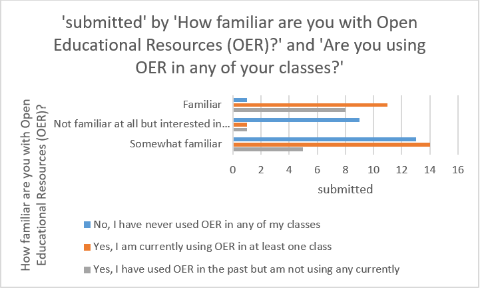
Full description: Bar graph showing Familiar, Not familiar at all but interested in, Somewhat familiar
Familiar
- 1 response “No, I have never used OER in any of my classes.”
- 11 responses “Yes, I am currently using OER in at least one class.”
- 9 responses “Yes, I have used OER in the past by am not using any currently”
Not familiar at all but interested in
- 9 response “No, I have never used OER in any of my classes.”
- 1 response “Yes, I am currently using OER in at least one class.”
- 1 response “Yes, I have used OER in the past by am not using any currently”
Somewhat familiar
- 11 responses “No, I have never used OER in any of my classes.”
- 14 responses “Yes, I am currently using OER in at least one class.”
- 5 responses “Yes, I have used OER in the past by am not using any currently”
How familiar are you with Creative Commons?
- Somewhat familiar: 28
- Familiar: 21
- Not familiar at all but interested in learning more: 13
- Not familiar at all, and not interested in learning more: 1
Are you using OER in any of your classes?
- Yes, I am currently using OER in at least one class: 26
- No, I have never used OER in any of my classes: 23
- Yes, I have used OER in the past but am not using any currently: 14
What types of OER have you used?
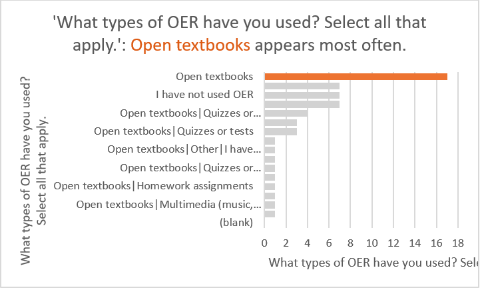
Full description: bar graph showing results of types of OER uses (note that numbers were challenging to analyse due to multiple selection option)
- Open textbooks: 29
- I have not used OER: 7
- Multimedia: 8
- Quizzes or tests/homework assignments: 10
- Other: 4
If you have not used OER in your classes, can you tell us why?
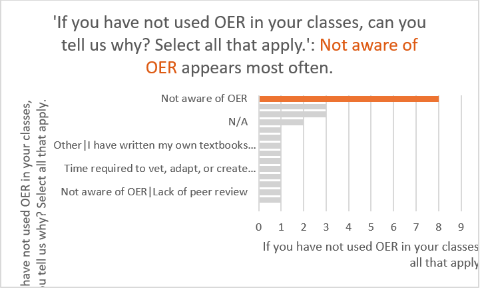
Full description: bar graph showing “Not aware of OER”, “N/A”, “Others/I have written my own textbooks”, “Time required to vet, adapt or create”, “Lack of peer review”
- Not aware of OER: 8
- N/A: 2
- Quality of available OER: 3
- Time required to vet, adapt, or create/Effort: 4
- Lack of peer review: 1
Have you ever created or adapted OER materials (rather than a straight adoption)?
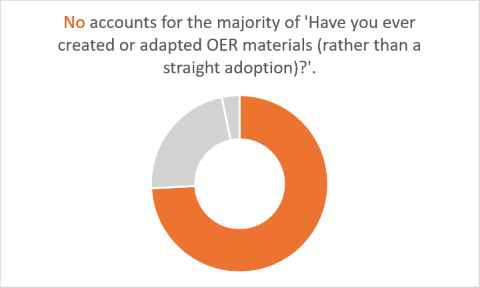
Full description: circle pie chart showing majority response “No”, second highest response: “Yes, at Camosun”, third highest response “Yes at another institution”
If yes, what types of OER have you created or adapted?
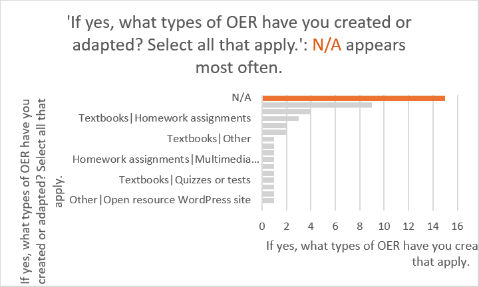
Full description: bar graph showing types of OER created
- Homework assignments: 21
- Textbooks: 9
- Multimedia: 4
- Quizzes or tests: 3
- Other: 5
Have you had support creating, adapting or using OER?
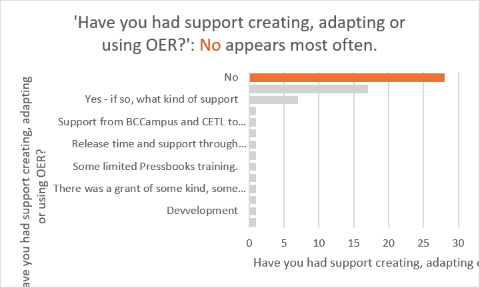
Full description: bar graph showing what kind of support has been received
- None: 28
- BCcampus and CETL, other Camosun support: 5
- Release time: 1
- Pressbooks training: 1
- SD time: 2
CETL and the library are interested in increasing OER adoption, adaption, and creation by faculty. How can we best support you to meet these goals?
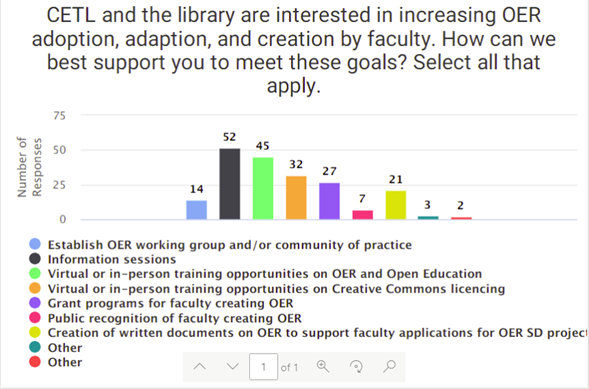
Full description: bar graph showing the following:
- Establish OER working group and/or community of practice: 14
- Information sessions: 52
- Virtual or in-person training opportunities on OER and Open Education: 45
- Virtual or in-person training opportunities on Creative Commons licencing: 32
- Grant programs for faculty creating OER: 27
- Public recognition of faculty creating OER: 7
- Creation of written documents on OER to support faulty applications for OER SD projects: 21
- Other: 5
Overall Themes and Recommendations
Organize general information sessions
- Collaboration for running info sessions: CETL, Library, Copyright office
- Provide basic information (what are OER, how they work, where to find them, where to get help)
- Include discussions around starting small, working with others to find appropriate resources, implications for intellectual property, and why OER are important
- Discussion of quality assurance and vetting resources
- Clarification of authorship and information on how OER are updated (find out more about this process at least at BCcampus and implications around it)
Collate resources in one place
- Update library Research Guide for Open – put together a team (CETL, Library, Copyright) and work on over the summer
- Include a list of who can support OER development at Camosun, and in what capacity
Department meetings info sessions
- Start in May/June, then Fall (collaborate CETL, Library, Copyright office)
- Fire up interest
- Find out who is already working on integrating OER and how
- Answer questions
Faculty Support and Engagement
- Workshops and other training opportunities for faculty
- Create a list of faculty members working with OER to support each other in varying ways
- Find ways to fund (grants?) faculty for adopting, adapting, creating, and reviewing OER
Talk to Student Society
- Engage with students
- Find out more about students’ perceptions of OER and provide information sessions for them (Student Society, student groups within programs, etc.)
Advocate to college leadership
- Show student savings in $ amounts for people who have adopted OER
- Discuss initiating grant or support (i.e., release time) opportunities for faculty to create and adapt OER
